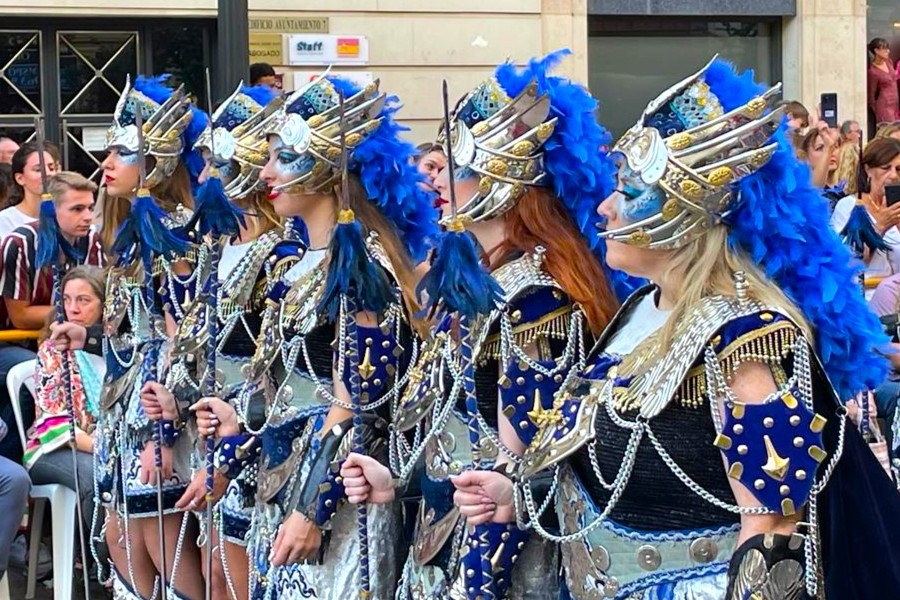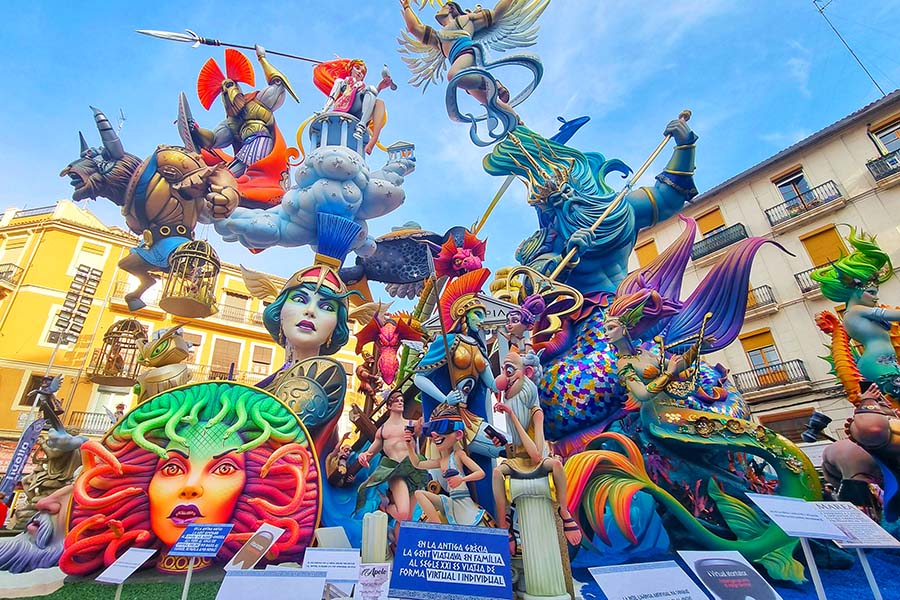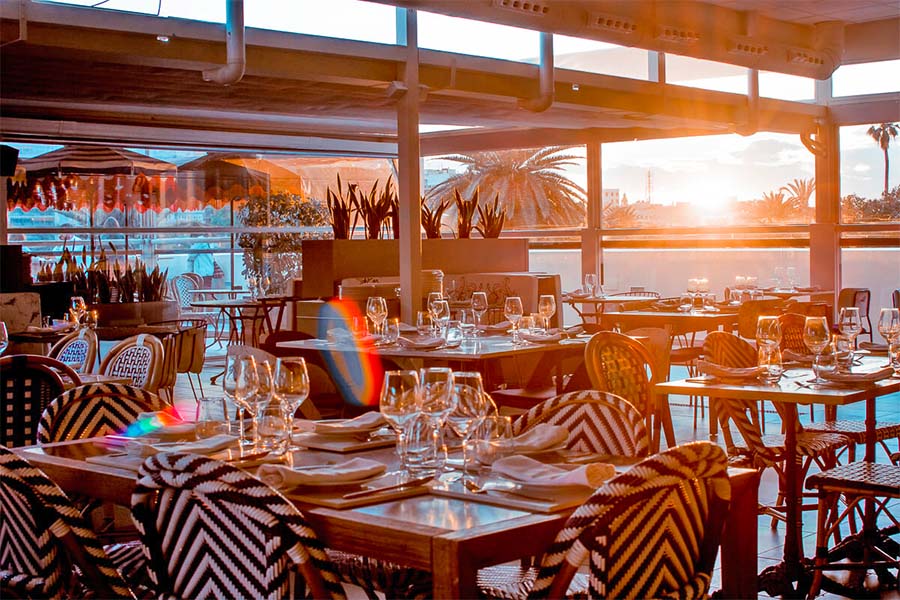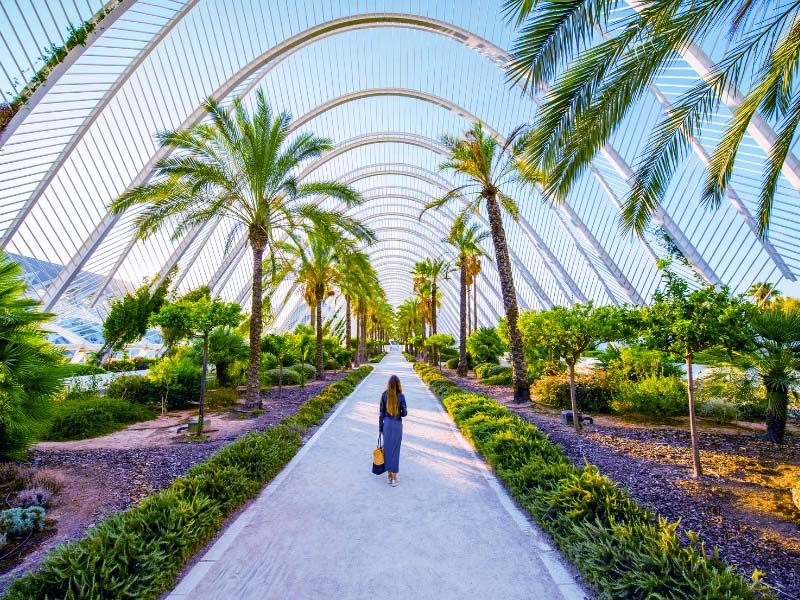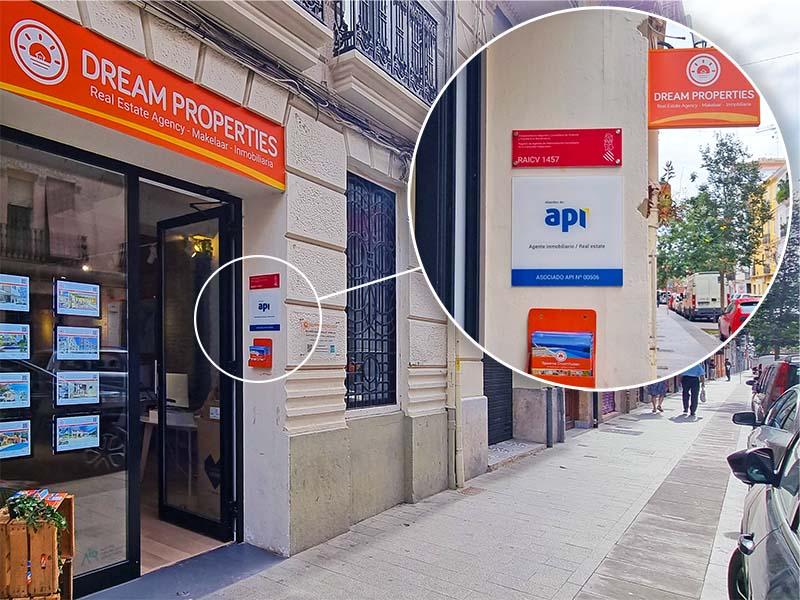Mark your calendars for the upcoming holidays so you won’t miss a single celebration in Valencia, or be caught off guard by the fireworks. Here are the official holidays Valencians observe:
- October 9 (Day of the Valencian Community)
- October 12 (National Day of Spain)
- November 1 (All Saints’ Day)
- December 6 (Constitution Day)
- December 8 (Feast of the Immaculate Conception)
- December 25 (Christmas Day)
Please be aware that supermarkets, shops, and restaurants may be closed on public holidays.
Holidays Valencia 2025
Thursday, October 9th
Día de la Comunidad Valenciana (Valencian Community Day)
Valencian Community Day commemorates the reconquest of the city from the Moors by Jaime I the Conquistador on October 9, 1238. The city observes this occasion with a variety of large-scale events. Additionally, an annual procession takes place, featuring the mayor and the cabinet, among others, parading through the city.
Mascletà: Naturally, all of this must be commemorated with fireworks, which are beloved by Valencians. The louder the fireworks, the more enjoyable they are. The parade culminates in a mascletà, or firecracker display. Prefer decorative fireworks? On the evening prior, October 8th at 11:59 PM, an elaborate fireworks show will take place.
Tip: At 12:00 PM, the Valencian flag is raised at the town hall in Plaza del Ayuntamiento. At 5:00 PM, a Moors and Christians parade takes place, showcasing exquisite costumes, horses, and music.
Sant Dionís (Patron Saint of Valencian Lovers) This day is not solely dedicated to the reconquest; it also commemorates love through the celebration of the patron saint of love, known as the feast of Sant Dionís. Traditionally, men present their beloveds with a mocadorà, a bundle of marzipan berries wrapped in a scarf or handkerchief.
Sunday, October 12th
Día Nacional de España (Spanish National Day).
This day marks the arrival of Christopher Columbus in America in 1492, symbolizing the historical and cultural connections with Spanish-speaking nations globally. As such, it serves as the national day of Spain and is recognized as an official holiday across the country. Although it is not celebrated on a large scale in Valencia, those wishing to experience the festivities should visit Madrid, where a military parade takes place, attended by the king and government officials.
Saturday, November 1st
Todos los Santos (All Saints’ Day)
Another day of respite for the people of Valencia. This time, they are observing All Saints’ Day, a Christian holiday recognized by the Catholic Church. This occasion commemorates all saints who have departed, while also honoring those who are still living and maintain their faith in God. The city will experience a quiet atmosphere, with no special events planned. Most individuals will spend the day visiting cemeteries with their families.
Saturday, December 6th
Día de la Constitución (Constitution Day)
Not a celebration of Sinterklaas’s return to Spain, but rather a commemoration of the Spanish Constitution. This national holiday marks a significant reform in Spain, specifically the establishment of democracy following years of dictatorship. Children receive supplementary history lessons on this subject, and the king delivers his annual address. Additionally, most Spaniards observe this day with family and friends.
Monday, December 8th
Inmaculada Concepción (Immaculate Conception)
The Immaculate Conception of Mary is commemorated across Spain. As per the Catholic Church, she was the selected one to give birth to Jesus. Consequently, it is recognized as an official holiday in Spain. While there are no public festivities, Spaniards come together with family and friends.
Thursday, December 25th
Navidad (Christmas)
In Spain, only Christmas Day is recognized as an official holiday, which is celebrated with family. On Christmas Eve, the day preceding Christmas Day, many Spaniards attend church with their families.
Tips: A Christmas market is located at Plaza de la Reina, and an ice skating rink can be found at Plaza del Ayuntamiento. Both are excellent destinations to explore. It is advisable to make reservations in advance.
Want to stay informed about next year and not miss anything? Then keep reading!
Holidays Valencia 2026
- January 1 (Año Nuevo)
- January 5/6 (Día de Reyes)
- January 22 (San Vicente Mártir)
- March 19 (San José)
- 29 March t/m 5 April (Semana santa)
- April 6 (Lunes Pascua)
- April 27 (San Vicente Ferrer)
- May 1 (Día de los Trabajadores)
- May 10 (Virgen de los Desamparados)
- June 23/24 (San Juan)
- 15 August (Asunción de la Virgen)
Thursday, January 1st
Año Nuevo (New Year’s Day)
More commonly referred to as New Year’s Day, this occasion is celebrated with great enthusiasm the evening prior, similar to traditions in the Netherlands, allowing everyone to enjoy a day of rest on the first of the year. Fireworks, champagne, and delightful company are essential elements of the festivities. In Spain, a unique custom involves consuming twelve grapes, so it may be quite a sight to witness someone with a mouthful of grapes.
Tips: On New Year’s Eve, numerous celebrations are held throughout the day at Plaza Ayuntamiento. Additionally, many clubs host vibrant parties (secure your tickets in advance!), and various restaurants provide a special NYE menu.
Tuesday, January 6
Día de Reyes (Three Kings Day)
In the Netherlands, we don’t do much for, Dia de Reyes, but in Spain, it seems most comparable to Sinterklaas. One with the Three Kings instead of Sinterklaas and Ozosnel. All the children will also prepare something tasty for the Three Kings in the evening, hoping they’ve been good this past year and will receive presents. The following day is an official holiday to end the Christmas holidays.
This festival also includes the Roscón de Reyes: a round, sweet bread wreath, often filled with whipped cream or pastry cream and decorated with candied fruit symbolizing the crowns of the kings. Traditionally, the Roscón contains two surprises: a figure (whoever finds it gets to wear the crown) and a bean (whoever finds it has to pay for next year’s Roscón).
Tips: On the evening of January 5th, the colorful Cabalgatas de Reyes parade through the city: a fun parade for children where the Three Kings hand out sweets.
Thursday, January 22
San Vicente Mártir (Saint Vincent the Martyr)
Saint Vincent the Martyr serves as the patron saint of Valencia. For five centuries, he has been regarded as the preeminent martyr of the West. Consequently, there is an annual day devoted to his commemoration and veneration.
Tips: You may participate in a holy mass at the Valencia Cathedral or observe the procession throughout the city.
Thursday, March 19
San José (Saint Joseph)
On March 19th, Spaniards commemorate Father’s Day. This occasion is dedicated to honoring their (deceased) fathers, and families come together to celebrate. It coincides with the feast day of Saint Joseph, the husband of Mary and father of Jesus, making it an official holiday in Valencia.
Fallas
For Valencians, March 19th signifies the conclusion of Las Fallas, which commences in late February. The remarkable artworks, crafted over several months, are subsequently ignited. This breathtaking finale is complemented by fireworks, music, and a multitude of events across the city. Read more in our special Fallas blog post.
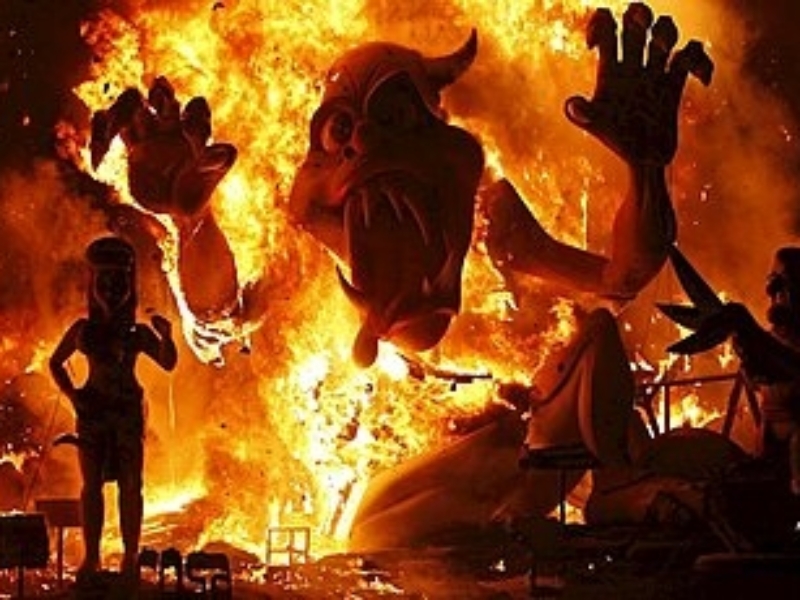
March 29 to April 6
Easter Week
Sunday, March 29 – Domingo de Ramos (Palm Sunday)
Easter week begins with the commemoration of Jesus’ entry into Jerusalem. Families attend Mass carrying palm or olive branches, often intricately woven.
Thursday, April 2 – Jueves Santo (Maundy Thursday)
On Maundy Thursday, the Last Supper is commemorated. In the evening, impressive processions pass through the streets of Valencia’s maritime neighborhoods, featuring the traditional Nazarenos in their robes and tall pointed hats (capirotes). This gives the processions their unique and sometimes mysterious aura.
Friday, April 3 – Viernes Santo (Good Friday)
The day on which the suffering and death of Jesus on the cross are commemorated. Good Friday also features silent and solemn processions, accompanied by drums and torches.
Saturday, April 4 –Sábado Santo (Holy Saturday)
A day of mourning and reflection. Fewer activities are held because people are remembering the death of Jesus Christ.
Sunday, April 5 – Domingo de Resurrección / Pascua (Easter Sunday)
The atmosphere shifts to joy and celebration. In the morning, the Gloriosa Procession of the Resurrection parades through the city, with flowers, music, and statues of the resurrected Christ and the Virgin Mary. This is the highlight of Holy Week in Valencia.
Monday, April 6 –Lunes de Pascua (Easter Monday)
A day without religious ceremonies, yet still important for families. Valencians flock to parks or the beach for picnics and enjoy the traditional Mona de Pascua together: a richly decorated sweet bread or cake with chocolate figures.
Monday, April 27
San Vicente Ferrer (Saint Vincent Ferrer)
The celebration of San Vicente Ferrer, the patron saint of the Valencian region, is a significant event in Valencia, characterized by religious processions, fireworks, and performances. Altars are constructed throughout the city. Children under the age of 13 present brief plays in verse and Valencian, illustrating scenes from the life and miracles of San Vicente Ferrer.
Tips: In Valencia, you can visit the birthplace of San Vicente Ferrer, Casa Natal de San Vicente Ferrer.
Friday, May 1st
Día de los Trabajadores (Workers’ Day)
Also referred to as Workers’ Day, this holiday grants everyone a day off, resulting in bustling restaurants and bars. Additionally, some individuals utilize this occasion to advocate for improved wages.
Tips: Make your catering reservations in advance to secure your place.
Sunday, May 10th
Virgen de los Desamparados (Virgin of the Helpless)
The Virgin of the Helpless serves as the patron saint of Valencia, particularly for the impoverished, the ill, and those lacking support. The holiday is wholly devoted to her veneration. The celebrations commence the preceding Saturday, featuring fireworks and traditional dancing. The day itself encompasses a mass, the procession of the statue through the city, and additional fireworks.
Tips: An open-air children’s mass commences at 8:00 AM in the square adjacent to the basilica. The procession of the statue of the Virgen de los Desamparados begins at 10:30 AM. A mascletà is scheduled for 2:00 PM in the Plaza del Ayuntamiento. Finally, a procession will start at 5:30 PM.
Tips: At 8:00 AM, an open-air children’s mass begins in the square near the basilica itself. At 10:30 AM, the moving of the statue of the Virgen de los Desamparados begins. At 2:00 PM, a mascletà takes place in the Plaza del Ayuntamiento. Finally, a procession begins at 5:30 PM.
Tuesday 23 & Wednesday 24 June
San Juan (John the Baptist)
For many, this holiday centers predominantly on the evening and night preceding it, referred to as Noche de San Juan. This occasion celebrates the shortest night of the year and the onset of summer. Individuals congregate with friends and family on the beach, where numerous campfires are set up for the traditional act of jumping over them for good fortune. At midnight, participants leap over the waves seven times to make a wish. The following day is an official holiday for Valencians, although this doesn’t apply to all of Spain.
Saturday, August 15
Asunción de la Virgen (Assumption of the Virgin)
It is the day on which Spaniards honor the Virgin Mary, who ascended to heaven on this occasion. This celebration is among the oldest Christian festivals in Valencia and has been observed for centuries, dating back to 1352.
The holidays in Valencia perfectly illustrate why so many people fall in love with this city. Living here isn’t just about having a house; it’s also about enjoying the culture, traditions, and Mediterranean lifestyle.


